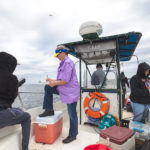UWF faculty member receives national attention for insights on the earliest US domestic cats

Dr. John Bratten, a University of West Florida professor of anthropology, has received national attention for a recently published article, titled “Exploring the Arrival of Domestic Cats in the Americas,” that suggests the earliest cats may have been treated as pets.
The article, published in “American Antiquity,” a peer-reviewed quarterly journal published on behalf of the Society for American Archaeology, focuses on feline remains uncovered from the Emanuel Point II shipwreck, part of the 1559 fleet led by Spanish explorer Tristán de Luna y Arellano and discovered in Pensacola Bay.
“This is the earliest cat to be archaeologically discovered in the present day United States,” Bratten said. “By reviewing other archaeological reports, we were able to trace the spread of cats in the Americas up to 1760. Their arrival and spread mirrors European settlement with the use of ships as transport.”
Through detailed isotopic analysis, the study reveals that the adult cat found on the ship likely had a diet rich in fish and domestic meats rather than rodents. These findings suggest that cats aboard early transatlantic voyages may have been viewed not only as pest controllers but also as valued companions that were cared for as pets.
The study’s implications extend beyond the fate of one cat — it provides a rare glimpse into shipboard life during one of the earliest European colonization efforts in the New World.
“The response to the article in the anthropology community and beyond has been exciting,” Bratten added. “Undoubtedly, this is related to the fact that one in every three households in the United States shares their space with a cat today.”
Bratten co-authored this article with Martin H. Welker, associate professor of anthropology and associate curator of zooarchaeology at Arizona State University, and Eric Guiry, honorary research fellow in the School of Archaeology and Ancient History at the University of Leicester.
To learn more about the UWF anthropology program, visit uwf.edu/anthropology.



